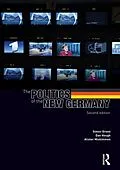The Politics of the New Germany continues to provide the most comprehensive, authoritative and up-to-date textbook on contemporary German Politics. It covers the entire postwar era but has a particular focus on the post-reunification era.
Autorentext
Simon Green is Professor of Politics at Aston University. He has written widely on German politics, and especially on immigration and citizenship policy in Germany.
Dan Hough is Reader in Politics and Director of the Sussex Centre for the Study of Corruption at the University of Sussex. He has published widely on parties and party systems, devolution and constitutional change, and German politics.
Alister Miskimmon is Senior Lecturer in European Politics and International Relations at Royal Holloway, University of London. His research interests are in the field of German foreign policy, as well as wider European and global security issues.
Zusammenfassung
The Politics of the New Germany continues to provide the most comprehensive, authoritative and up-to-date textbook on contemporary German Politics. The text takes a new approach to understanding politics in the post-unification Federal Republic. Assuming only elementary knowledge, it focuses on a series of the most important debates and issues in Germany today with the aim of helping students understand both the workings of the country's key institutions and some of the most important policy challenges facing German politicians.For this second edition, the content has been comprehensively updated throughout, augmented by additional factboxes and data, and features new material on:Grand coalitionLisbon treatyConstitutional courtFinancial crisis Reform of social policyAfghanistan.Written in a straightforward style by three experts, each of the chapters draws on a rich variety of real-world examples. In doing so, it highlights both the challenges and opportunities facing policy-makers in such areas as foreign affairs, economic policy, immigration, identity politics and institutional reform. The book also takes a bird's-eye view of the big debates that have defined German politics over time, regardless of which political parties happened to be in power. It pinpoints three key themes that have characterised German politics over the last sixty years; reconciliation, consensus and transformation.The book is a comprehensive, yet highly accessible, overview of politics in 21st Century Germany and should be essential reading for students of politics and international relations, as well as of European and German studies.
Inhalt
Introduction 1. Germany and the Burden of History 2. Germany's Post-War Development, 1945-1989 3. Towards German Unity? 4. A Blockaded System of Government? 5. Parties and Voters: The Path to Fluid Party Politics 6. Citizenship and Demographics: (Still) A Country of Immigration? 7. Economic Management: The End of the German Model? 8. Welfare Policy in Germany: Beyond Sustainability? 9. Germany and the European Union: From a Musterknabe to a Frustrated Lehrmeister? 10. Germany and the Wider World: Finding A New Role for the Twenty-First Century? 11. Conclusion: Three Themes Reassessed
